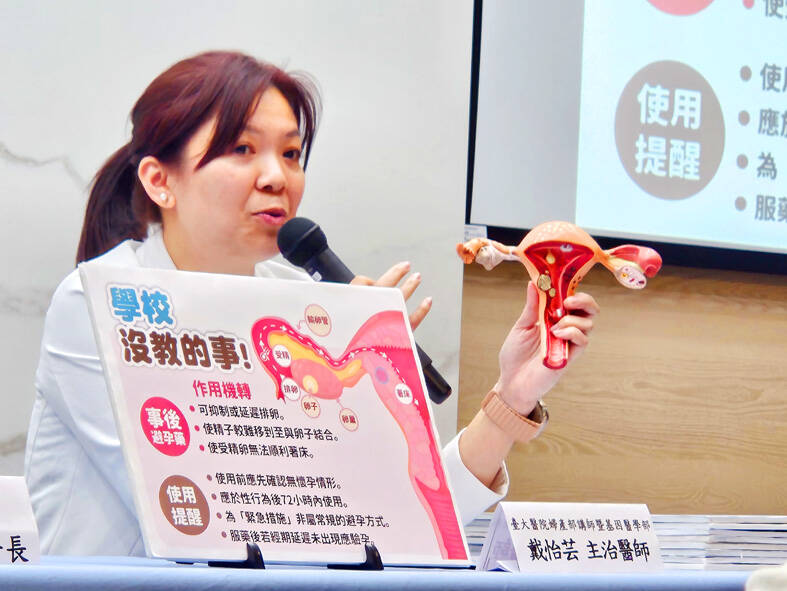Taiwan might partially authorize emergency contraceptives, also known as morning-after pills, to be sold over the counter following an ongoing regulatory experiment in Japan, the Food and Drug Administration (FDA) said yesterday.
The agency last week initiated the legal process for conducting medical trials by convening the first of the several public opinion gathering conferences required by law, Medicinal Product Division deputy head Lin Yi-chu (林意筑) told a news conference.
The FDA would amend its proposal based on the public input and submit it to the Ministry of Health and Welfare’s Human Research Ethics Review Board for approval, Lin said.

Photo: CNA
The agency hopes the trial could start as soon as possible, she added.
The Japanese Ministry of Health, Labor and Welfare, and Japan Pharmaceutical Association are jointly conducting a trial on which the FDA proposal is based, she said.
In the Japanese trial, women or girls aged 16 or above may buy a dosage of drugs that are intended to prevent pregnancy without a prescription from an authorized pharmacy, Lin said.
The woman must take the drug in the presence of the pharmacist and visit a gynecologist appointed by the clinic three weeks after that, she said
The Japanese program has 340 collaborating pharmacies, and a clinic is designated for every two or three pharmacies to increase availability, she said.
Taiwanese law classifies contraceptive medicine as prescription drugs, meaning the sale of such substances without a prescription is an offense punishable by a fine of up to NT$2 million (US$62,467), Lin said.
The FDA said it has been planning to allow over-the-counter contraceptives since 2016.
Doctors, pharmacists, women and children’s welfare groups, and parental rights groups in Taiwan broadly agree that the drug should be made available to protect women’s health, but disagreed on distribution methods, it said.
Morning-after pills are a class of contraceptive medicine that should be taken within the first 72 hours after unprotected sexual intercourse, National Taiwan University Hospital Department of Genetic Medicine doctor Tai Yi-yun (戴怡芸) said.
Morning-after pills typically contain synthetic progesterone that suppresses or delays ovulation, so they are not recommended for long-term use, Tai said.
Contrary to widespread belief, especially among men, the withdrawal method does not reliably prevent pregnancy, as sperm is present in prostatic fluids, she said, adding that menstrual tracking is also unreliable due to natural variances and irregularities in the cycle.
Concerns that oral contraceptives could permanently inhibit fertility have no scientific basis, and it takes about three months for menstrual cycles and fertility to return to normal after stopping taking oral contraceptives, she said.

The manufacture of the remaining 28 M1A2T Abrams tanks Taiwan purchased from the US has recently been completed, and they are expected to be delivered within the next one to two months, a source said yesterday. The Ministry of National Defense is arranging cargo ships to transport the tanks to Taiwan as soon as possible, said the source, who is familiar with the matter. The estimated arrival time ranges from late this month to early next month, the source said. The 28 Abrams tanks make up the third and final batch of a total of 108 tanks, valued at about NT$40.5 billion

Two Taiwanese prosecutors were questioned by Chinese security personnel at their hotel during a trip to China’s Henan Province this month, the Mainland Affairs Council (MAC) said yesterday. The officers had personal information on the prosecutors, including “when they were assigned to their posts, their work locations and job titles,” MAC Deputy Minister and spokesman Liang Wen-chieh (梁文傑) said. On top of asking about their agencies and positions, the officers also questioned the prosecutors about the Cross-Strait Joint Crime-Fighting and Judicial Mutual Assistance Agreement, a pact that serves as the framework for Taiwan-China cooperation on combating crime and providing judicial assistance, Liang

A group from the Taiwanese Designers in Australia association yesterday represented Taiwan at the Midsumma Pride March in Melbourne. The march, held in the St. Kilda suburb, is the city’s largest LGBTQIA+ parade and the flagship event of the annual Midsumma Festival. It attracted more than 45,000 spectators who supported the 400 groups and 10,000 marchers that participated this year, the association said. Taiwanese Designers said they organized a team to march for Taiwan this year, joining politicians, government agencies, professionals and community organizations in showing support for LGBTQIA+ people and diverse communities. As the first country in Asia to legalize same-sex

MOTIVES QUESTIONED The PLA considers Xi’s policies toward Taiwan to be driven by personal considerations rather than military assessment, the Epoch Times reports Chinese President Xi Jinping’s (習近平) latest purge of the Chinese People’s Liberation Army (PLA) leadership might have been prompted by the military’s opposition to plans of invading Taiwan, the Epoch Times said. The Chinese military opposes waging war against Taiwan by a large consensus, putting it at odds with Xi’s vision, the Falun Gong-affiliated daily said in a report on Thursday, citing anonymous sources with insight into the PLA’s inner workings. The opposition is not the opinion of a few generals, but a widely shared view among the PLA cadre, the Epoch Times cited them as saying. “Chinese forces know full well that